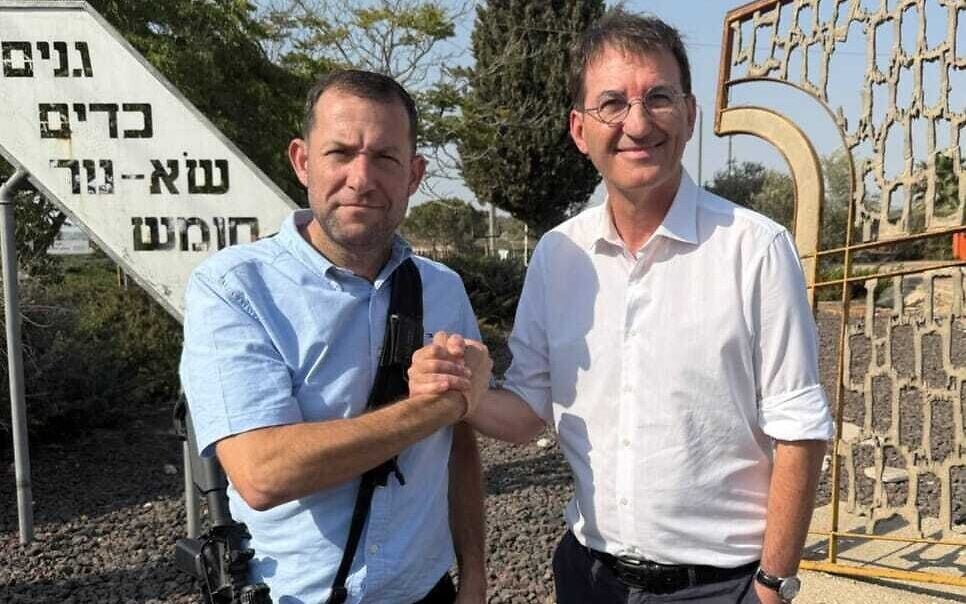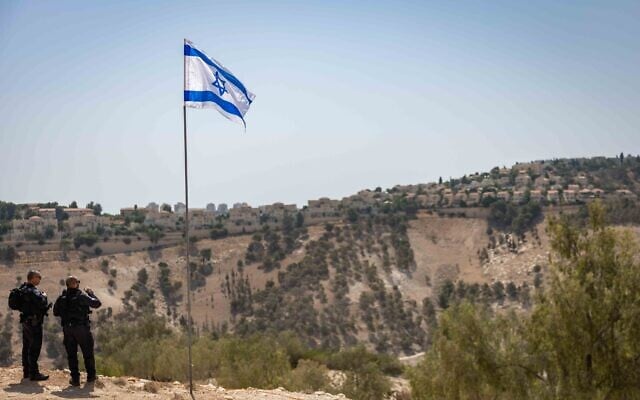



Likud MK Boaz Bismuth said Tuesday that applying Israeli “sovereignty” in the West Bank was at least as important, and more urgent, than reaching normalization deals with neighboring countries.
Bismuth, an ally of Prime Minister Benjamin Netanyahu who was recently handpicked by the premier to become chair of the Knesset Foreign Affairs and Defense Committee, made the remarks on a tour of the northern West Bank as the guest of Yossi Dagan, head of the Samaria Regional Council, who has long lobbied the government to extend sovereignty over the territory.
The tour took Bismuth to settlements, farms and security lookout points alongside Dagan and Yoni HaYisraeli, head of the local branch of Likud.
In a video distributed by Dagan’s office, Bismuth said applying sovereignty to the West Bank, a step seen as akin to annexation of the territory, would be “a decisive victory” over Israel’s enemies.
The Knesset approved a non-binding motion in favor of annexing the West Bank in July. In recent years, in discussions about a potential normalization deal between Saudi Arabia and Israel, the kingdom has stipulated that Israel take concrete steps toward the establishment of a Palestinian state, which annexation would preclude.
“Normalization is important, but applying sovereignty is no less important, even more urgent,” Bismuth said. “With God’s help, we will do this quickly, because this war needs to end in victory.”
“I feel much more at home in Samaria than anywhere else in the world, and I’m very proud to be here,” said the lawmaker, who resides in Tel Aviv, in the video, using the biblical name for the northern West Bank.
Israel captured the West Bank, East Jerusalem, the Gaza Strip and the Golan Heights in the 1967 Six Day War. Israel has since annexed East Jerusalem and the Golan, in moves that much of the international community does not recognize.
The West Bank is now estimated to be home to more than 500,000 Israeli settlers, in addition to millions of Palestinians. Much of the international community says Israel’s military rule over the territory is illegal and views the settlements as violations of international law, which Israel disputes.
Annexation of the West Bank, or of its settlements, is a longtime aspiration of the Israeli right. In 2019, ahead of an election, Netanyahu pledged to annex the Jordan Valley, on the territory’s eastern flank. But that pledge and similar efforts took a backseat amid a protracted political crisis that saw a string of inconclusive elections, and one such plan in 2020 was scrapped in exchange for landmark normalization agreements with the United Arab Emirates and Bahrain.
The government has not pursued binding annexation legislation since, though it voted in similar numbers last year against the establishment of a Palestinian state.
Israel has so far refrained from annexing the West Bank and Gaza — which it withdrew from entirely in 2005 — amid international pressure for the territories to form the base of a Palestinian state and concern for demographic challenges should Israel take in millions more Palestinian citizens.
But far-right ministers in the current government have spoken repeatedly about their annexation aspirations, and Finance Minister Bezalel Smotrich has been leading a “de facto sovereignty plan” by expanding settlements and approving new ones. Last week, he announced plans for 3,000 housing units in the highly controversial E1 area between Jerusalem and Ma’ale Adumim, saying the move “buries the idea of a Palestinian state.”

